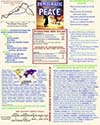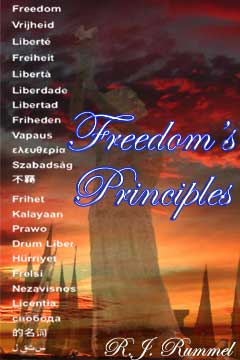[First published in May 18, 2005] In 1932, Stalin went to war against Ukrainian nationalism and resistance to collectivization. His weapon of choice was enforced famine. Stalin won. The “war dead?” About 5,000,000 Ukrainians who starved to death or died of associated diseases. Want to know what it was like for a Ukrainian villager then? Here is one possible story.
***
“We were starving to death,” Viktor suddenly blurted as I placed another beer before him. “My father, Petro Pynzenyk, was powerless to do anything about it, which made him very angry. I remember him shaking his feeble fist in the air and yelling to my mother Olena, ‘How could he do this to us? How could he starve us to death? God, why? What have we done to him?’
“My mother wouldn’t answer. Skeletal and weak with hunger, she could no longer leave their bed.”
Ignoring his beer, his eyes turned inward, Viktor finally let it all out.
***
Drought had brought famine to the Ukraine. But this famine was nothing compared to what Stalin, the absolute dictator of the communist Soviet Union, or USSR, was doing. He had launched a total blockade that prevented any food from getting into that Soviet republic. The communist cadre even searched travelers to the Ukraine to make sure they carried no food with them.
According to Stalin’s fanatical communist reasoning, Ukrainian peasant nationalism was a danger to his power that had to be subdued. The peasants also had strongly resisted giving up their homes, farms, and livestock to be collectivized into factory farms. Stalin’s weapon against such stubbornness and nationalism was starvation. He sent the communist cadre, activists, and security forces into the region to enforce his own man-made famine.
Petro Pynzenyk’s anguished outbursts against Stalin would almost exhaust him. He had been a handsome man in his youth, taller than most other peasants, with a round, open face and a strong brow. Even when age had grayed his hair, he had been well muscled, as heavy farm workers usually were. Now his ribs showed and his stomach was caved in; his arms and legs had grown bony, their muscles raped by his body for sustenance.
Viktor remembered watching him pry the soles off his shoes and then drop them into a pot of boiling water hanging in the fireplace. “Maybe they’ll add some flavor to the tree bark,” he rasped. It seemed that he could no longer say anything normally.
He was nonpolitical, tried to stay out of trouble, and did what the local communist functionaries asked. Except that, with all his being, he dreaded the demand he knew would soon come from Kiev—that he give up his one-acre farm and small home to collectivization. His father had worked all his life to develop and build this small farm. Petro did not want to give it up, but if he resisted, the communists would shoot him and his family.
Viktor was fourteen at the time. He spent the days hunting alone, because Petro, much to his shame, had grown too weak to join him. With a long-handled net, Viktor tried to catch any animals he saw around the village or in the unplowed fields, even former pets that the communists had missed when they came through, shooting them and stuffing the dead ones in sacks to be carried or trucked away. They’d also taken all the livestock, and had gone house to house looking for food, even seizing warm bread off the tables. When they learned that the villagers had started catching birds to eat, the communists again came through, shooting the birds out of the trees and bagging their little bodies.
When they came to the Pynzenyk home, they poked around the grounds outside the house with long rods, searching for buried food. They thus found the seeds Viktor’s mother had hidden by the pump, which they’d planned to use for planting if they survived.
Finally, as much as he didn’t want to believe it, Viktor realized they would not survive much longer.
One late afternoon when Viktor returned empty-handed to their house, he was just pulling the door shut behind him when he heard a distant scream. Alarmed but too weak to move himself, Petro waved Viktor outside to find out what was happening. Petro and Olena waited in tense silence as Viktor left the house. Viktor could tell they were scared. He followed the sound of the screams, which were soon punctuated by loud moans and gasps for breath.
When Viktor discovered what had caused the screams, he vomited up what liquid lay in his empty stomach. Sickened, revolted, he ran home and lay by his house and wept until too exhausted to cry anymore. Finally, he staggered inside.
He pushed the door shut behind him and stood there, swaying as if cornered. He could only gape at his parents, his mouth working. He started crying again, fighting to gulp air into his lungs, but dreading the news he had to tell his parents.
“What is it?” Petro demanded weakly.
Viktor ran over to his mother’s bed and threw himself down beside her, his whole body shaking. Olena put her bony arm around him, murmured some soothing words, and waited.
Finally, still trembling, Viktor blurted, “They ate her.”
“Ate who?” asked his father.
“Yana.”
“Yana? What are you talking about?” His mother looked from Viktor to Petro in confusion.
Viktor calmed down enough to explain, although tears still flowed. “Little Yana down the road. She went missing, and her father searched the woods and finally checked that crazy man Taran’s house on the other side of the stream. She was . . . ”
“What, Viktor?”
“She was . . . cut up in his . . . in his food pot. Her father grabbed a shovel and killed Taran and his mother with it.” Viktor’s stomach heaved at the memory, but nothing would come up. He whimpered, “She was such a fun little girl. She was always laughing and trying to trip me. She would make believe I was a horse.”
“My Holy God in Heaven,” Petro groaned. “I had heard this was going on, but in our village? No, God, I can’t believe it.”
Olena could only close her eyes and let the tears flow.
The days went slowly by, each a torment of hunger. Petro also grew too weak to leave his bed. Viktor continued to hunt, and captured some rats in the field. With the head of one he saved from the pot, he actually caught a starving dog whose own hunger had overcome its natural fear. His parents always gave him the largest part of any catch. They wanted Viktor to live to remember them, and what had happened.
Olena died two weeks later, and Petro the following week. With the death of his father, Viktor gave up all hope. He was lying on their bed, just waiting for the end, when Stalin ordered the release of grain from the military warehouses.
Local officials soon started going from village to village, looking for survivors. When they came to Viktor’s house, they knocked on the door. Receiving no response, they entered and, one told him later, were nearly overcome by the smell of urine, feces, and death. They found Viktor almost dead, lying next to the rotting corpses of his mother and father on a pile of filthy blankets. Viktor was not the first one they’d seen in this condition; they knew what to do. He was carried outside and propped on the ground to be spoon-fed thin soup.
***
Unlike all but a few in his village, Viktor survived. Five million Ukrainians did not.
Even this did not satisfy Stalin. He decided that the core Ukrainian culture had to be destroyed. And who was at the heart of this culture? The blind traveling musicians, who played and sang the classical Ukrainian music and folk tunes, and recounted tales of Ukrainian heroes. So, Stalin had communist officials call all the folk musicians together for a festival, and then had them all shot to death.
How can we prevent this from ever happening again? Through the democratic peace.
War/democide Docudramas



 Posted by rudyrummel
Posted by rudyrummel 






